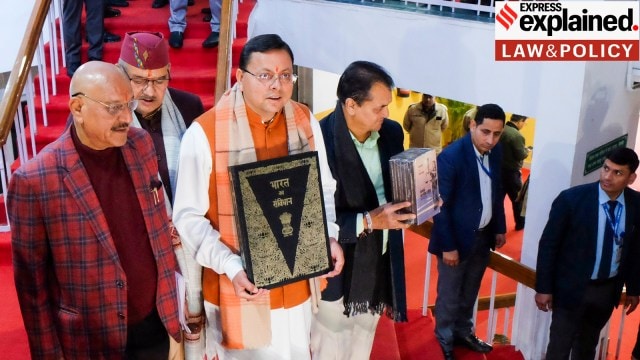Inheritance in Uttarakhand UCC: What do Hindus, Muslims, and Christians gain or lose?
Uttarakhand Uniform Civil Code Bill: The law makes registration of live-in relationships mandatory — what succession rights to their children get? What about queer and transgender people?
 Uttarakhand Chief Minister Pushkar Singh Dhami with others holds a copy of the Constitution of India, at Vidhan Sabha Bhawan, in Dehradun, Tuesday, Feb. 6, 2024. (PTI Photo)
Uttarakhand Chief Minister Pushkar Singh Dhami with others holds a copy of the Constitution of India, at Vidhan Sabha Bhawan, in Dehradun, Tuesday, Feb. 6, 2024. (PTI Photo) The Uttarakhand Uniform Civil Code (UCC) Bill, 2024 has a large section on succession and inheritance. The provisions in the Bill impact all communities to varying degrees. This is how.
First, what is the existing legal framework governing succession rights?
Succession is currently governed by The Indian Succession Act (ISA), 1925; The Hindu Succession Act (HSA), 1956; and the uncodified Muslim personal law.
For persons who are married under the Special Marriage Act (SMA), 1954, inheritance takes place as per the ISA. However, this does not apply to two Hindus who get married under the SMA. Their inheritance rights continue to be governed by the HSA.
For people who get married under their respective personal laws, the personal law of succession applies.
And what happens when the Uttarakhand UCC Bill, 2024 becomes law?
The Uttarakhand Uniform Civil Code, 2024 will apply to all persons irrespective of their religion.
The scheme of succession in the UCC Bill resembles that under the ISA. For people who die without leaving a will, the Class I heirs under the UCC Bill are the spouse, the children and the parents of the deceased, and certain heirs of predeceased children. All of them will get an equal share in the property of the deceased person.
In the absence of these heirs, the property will be inherited by other heirs such as the brother and sister of the deceased and their children.
If these specified heirs do not exist, the property will be inherited by the closest relatives in line.
What do the provisions of the Bill mean for the Muslim community?
Testamentary succession for Muslims takes place as per the Shariat. A person may bequeath only 1/3rd of their property through a will. The remaining property passes through the prescribed scheme of succession. The UCC Bill does not have this limit on testamentary succession.
The limit generally protects heirs against being dispossessed, and its removal may especially leave vulnerable groups such as women and queer persons at the risk of being disinherited because of their gender and sexuality.
In its 2018 Report on the Uniform Civil Code, the Law Commission had in fact, recommended that even for Hindus, some portion should be reserved for the widow, unmarried daughter(s), and other dependants to protect against such disinheritance.
For Muslims currently, Class I heirs include the mother, the grandmother, the husband, the wives, the son’s daughter, etc., and the Quran lays down specific shares for them. The remaining property passes to other heirs through meticulously laid down rules.
One such rule is that similarly placed female heirs get half the share of similarly placed male relatives. Thus, the daughter gets half the share due to the son.
This changes with the UCC Bill — in which both such parties will inherit equally.
And how does it affect the succession rights of Hindus?
Hindu law recognises the concept of joint families, and distinguishes between self-acquired property and ancestral property.
A core group in a joint family is a coparcenary, which consists of male and female lineal descendants up to the 3rd generation. They acquire a right by birth in the joint family property, i.e., ancestral property. Upon the death of a coparcener, the shares which devolve on the heirs of the person vest in them as their separate property.
Through an Amendment to the HSA in 2005, daughters were made coparceners.
A key feature of coparcenary property is that it cannot be sold or disposed of through a will by any coparcener, including the father. This serves to ensure a guaranteed share for daughters in coparcenary property.
The Uttarakhand UCC Bill repeals all existing laws that are inconsistent with it, and applies the same scheme of succession to all persons irrespective of religion.
Coparcenary rights do not find any mention in the Bill. Thus, the same scheme of succession will now apply for both ancestral and self-acquired property for Hindus. The limited protection afforded by the coparcenary system will not be available.
The UCC Bill does not address Hindu Undivided Families (HUFs) as a category. HUFs have been given legal status as a trading entity. They are treated as a separate entity for the purposes of taxation under the Income Tax Act, 1961, and enjoy certain exemptions. The Law Commission in its 2018 Report had observed that the HUF system may be used for tax avoidance.
Under the HSA, property passes differently for male and female intestates.
For male intestates, the Class I heirs are the children, the mother, the spouse, and children of predeceased children. The father, siblings, the stepmother, etc., are Class II heirs, and inherit only in the absence of Class I heirs. Thus, the mother completely excludes the father from inheritance.
Female intestates have the same set of Class I heirs. However, the husband’s heirs, like the father-in-law, are next in line. The woman’s own relatives, like her father and mother, only inherit in their absence.
This is not the case with the UCC Bill, which prescribes the same scheme of succession irrespective of the gender of the intestate.
Another key change is that the father and the mother are both equal heirs in the property of their children under the UCC Bill.
Does anything change for Christians?
Under the ISA — which applies to those married under the SMA and to Christians — the parents of the deceased inherit only in the absence of lineal descendants like children and grandchildren.
This position changes in the UCC Bill, where both categories of heirs inherit together.
Further, under the ISA, there is disparity between the mother’s and the father’s rights of inheritance. The father excludes the mother from inheritance altogether. The father also excludes the siblings from inheritance, but the mother inherits alongside the siblings.
In the UCC Bill, both parents inherit property, and exclude the siblings from inheritance.
Have the interests of the queer community been addressed in the UCC Bill?
While the UCC Bill does not discriminate between male and female heirs when it comes to their inheritance shares, it continues to employ gendered terminology. Property is thus inherited by “husbands” and “wives” and “fathers” and “mothers”.
Transgender persons are recognised as the “third gender” under the law. It, therefore, remains unclear how transgender persons will inherit property under the UCC Bill, unless they adhere to the gender assigned to them at birth, i.e., male or female.
What legal regime has been created for live-in partners? Do any substantial succession rights emerge for them or their children?
The Supreme Court in some cases has recognised succession rights for children born out of void and voidable marriages, and live-in relationships under the HSA. The UCC Bill specifically recognises children born out of live-in relationships as legitimate children. Thus, they will have the same rights as children born out of a valid marriage, including inheritance rights. This right is now available to children of all religious communities.
While children born out of registered live-in relationships will be treated as legitimate children, the partners themselves do not have access to any non-testamentary succession. If one of the registered live-in partners dies without a will, the surviving partner would not receive anything, but the child would be entitled to their share of the estate as a “Class-1” heir. So, a surviving live-in partner is essentially “skipped” over when the estate devolves to the deceased person’s heirs.
Only limited maintenance rights have been provided for women if they are deserted by their partner — it remains unclear if the woman can seek maintenance from the estate of a deserting deceased person. This underlines that registration of a live-in relationship creates a responsibility to avoid penalisation, rather than giving partners access to any succession rights.
What happens to partners in existing polygamous marriages?
The UCC Bill prohibits polygamy.
However, while doing so, it does not specify how inheritance will work for those who are currently in multiple valid marriages, and what share the spouses in such a marriage will get.
For instance, the HSA clarifies that in case of more than one widow, all of them will together inherit the share due for spouses. The position under Muslim personal law is the same.
Rakshita Goyal is a research fellow at the Vidhi Centre for Legal Policy. Surbhi Sachdeva is a project fellow at the Vidhi Centre for Legal Policy.
- 01
- 02
- 03
- 04
- 05






































